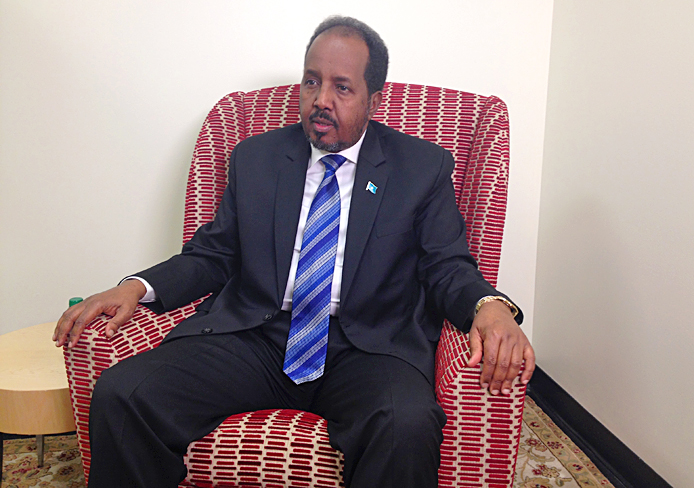
Somali President Hassan Sheikh Mohamud speaks at the Ohio Union Sept. 23.
Credit: Caitlin Essig / Managing editor for content
“Sometimes you need to go and see how life is going in other parts of the world, then only you can evaluate the one you have here.”
When the president of Somalia visited Ohio State Monday, he tried to leave students with an international mindset.
“You have to go out of the box, America is its own world,” said Somali President Hassan Sheikh Mohamud in a Monday interview with The Lantern. “You need to go to Africa and Asia, particularly Africa, where you will see how the bad politics lead the nations into very difficult circumstances.”
Somalia is located on the Eastern coast of Africa.
Mohamud was met by both supporters and protesters when he spoke to students, faculty and members of the community in a public lecture forum at the Ohio Union. Mohamud, who was named to “Time” magazine’s list of 100 most influential people in April, spoke for about an hour in a lecture co-sponsored by the Columbus Council on World Affairs, the Somali Students Association, OSU and other university groups.
Many of Mohamud’s talking points centered on education, which has been integrated into many aspects of his life. He attended Somali National University, was a lecturer there, helped start SIMAD University in Mogadishu, Somalia, and served as that university’s dean for 10 years. Mohamud was elected into the presidency Sept. 10, 2012, under the Peace and Development Party, which he founded.
He said he wanted students who attended his lecture to remember one message.
“What I want students to keep in mind is Somalia,” Mohamud said. “So (be) there, sit with the Somali students, share with them what the life looks (like) here and how the people who are learning in these universities, what future they are looking at, what possibilities they have, and how that’s similar to the possibilities that can happen (in Somalia).”
Ilhan Dahir, a third-year in political science and English, introduced Mohamud before his speech on behalf of OSU’s Somali students. Following the speech, she said Mohamud’s words made her realize his sense of hope.
“The one thing, the major thing that I’m taking away from the program today is that, although it seems bleak now, there is definitely hope for a better future,” Dahir said. “And hearing the president speak about what he is doing specifically to make that future happen was very exciting.”
Dahir has extended family members who still live in Somalia, and said although she identifies as American, the opportunity to welcome Mohamud was exciting.
“There is still a huge part of me that identifies as Somali because of my ancestry,” Dahir said. “And so it’s very exciting, it felt like such an honor to meet him and to introduce him.”
The president’s visit to Columbus was perhaps purposefully located, emphasizing the prominence of the Somali community in the Columbus area. According to the Somali-American Chamber of Commerce, Columbus has one of the largest populations of Somali people in the United States, with more than 75,000 Somalis living in and around Central Ohio.
Some students who attended the speech said they were surprised by how relatable Mohamud was, despite being the president of a country they’d never visited.
“I thought it was really interesting how he used sort of very Western terminology for a lot of things,” said Max Mauerman, a third-year in political science and economics. “I think that we have this conception in America of what an African leader would look like and this is very much not what I expected him to be.”
This perspective on people and places beyond America’s borders, and in Somalia in particular, was a common point in Mohamud’s speech as well.
“The news offers a depressing window on the country,” he said in his speech. “Come see for yourself the birth of the nation.”
Mohamud dug a little deeper into what he envisions for Somalia’s future in his exclusive interview with The Lantern.
“I see the future as very good,” Mohamud said. “The problem we have (had) in my country, the serious challenge that is put into this place, is lack of leadership. We have never had good leaders in the past.”
He mentioned having past leaders who were “not qualified” to lead Somalia.
“To shape the nation, you need to affect the mindset of the people, so that people will think of positive actions instead of conflict and competition at the lowest level,” Mohamud said.
He said one thing the U.S. does, which he would like to see happen in Somalia, is focus on more international competition rather than competition within his country.
“We are competing among us in Somalia, we are not competing with the rest of the world,” Mohamud said. “And this nation, the United States, one of the good things that it does is competing with the rest of the world, in terms of science, in terms of technology, in terms of diplomatic strength. But when a nation starts to compete itself, inside it, that’s when it becomes so prone to collapse. And that’s what has happened inside Somalia.”
Despite this, Mohamud emphasized the overarching theme of a country that is moving forward.
“These are some of the things that we are dreaming to see tomorrow — that people are coming and staying,” Mohamud said. “We will give you the right signal at the right time to come back, to go back to Somalia, or go for the first time or whatever.
“The mindset of this generation is what is crucial; we want you to come back to Somalia to see it.”


